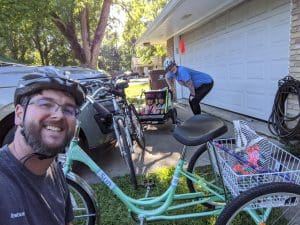
How to Axe Self-Sabotaging Behavior
Self-sabotage is uniquely human behavior. Many of us sabotage ourselves when we decide we want something by doing everything we can to ensure we don’t get it. Sound familiar? Although self-sabotage is a subconscious behavior, we can get a handle on it.
There are many reasons that you might sabotage yourself. It’s an extremely common behavior, rooted in a fear of the unknown. If you’ve immersed yourself in mediocrity, the idea of greatness may be frightening. Ask yourself if you’re satisfied with your life. Find out why you may self-sabotage:
1. Control. You might self-sabotage because you have a need to be in control of your circumstances. The easiest and most certain way to stay in control is to maintain the status quo. If you put your all into something, you run the risk of becoming vulnerable. Fear gets the best of you and you self-sabotage.
2. Low self-esteem. Do you feel unworthy of greatness? For whatever reason, you may have decided that happiness ought to be forever beyond your reach. This is a self-limiting idea, and it becomes a self-fulfilling prophecy.
3. Excitement. Perhaps you undermine your efforts because you’re seeking excitement. You feel the need to remain in a constant state of turmoil to distract yourself from painful memories or alleviate boredom.
If you see yourself in any of these descriptions, fear not: there are steps you can take to put yourself on the path toward self-mastery.

Consider this process for defeating your self-sabotage:
1. Observe your behavior. First off, it’s essential that you begin to observe yourself. You can effectively do this by creating a self-sabotage journal. Make a journal entry every time you realize that you’ve sabotaged yourself. Describe the setting, circumstances, and end result. Avoid over-analyzing.
- Most often, a person’s true intentions are most evident in their actions, rather than their words.
- Strive to be an impersonal observer in your journal. Eventually, you’ll gain a better understanding of your motives in certain situations.
2. Envision success. Keep in mind that success is neither black nor white. Cultivate the habit of envisioning what success means to you and remember how it feels to achieve it. If you do this consistently, you may find that what you envision changes over time.
- Begin to see success as an integral part of your future, but realize there will still be challenges. Just like everyone else, you’ll still have to pay taxes and have relationship issues.
3. Let go of the notion of perfection. As you visualize success, are you still thinking that success equals perfection? If so, it’s time to realize that nobody is perfect.
- This is what George Bernard Shaw would refer to as “doublethink.” Perfection and life are mutually exclusive because perfection is unattainable. Your subconscious won’t allow you to achieve success if you associate success with the impossible task of being perfect.
- Think of your subconscious as a computer. It doesn’t know how to execute a command called “do the impossible.”
- If you associate success with fear, your subconscious will fight you the 2 entire way. Why? Because its primary function is to protect you from perceived threats.
Give yourself permission to anticipate success with excitement. Perhaps you’ve been sending your subconscious the message, “Don’t give me success!” So, let’s put your self-sabotaging behaviors in the past!
Embrace the good life you deserve by picturing yourself as successful, and then refuse to talk yourself out of going for it. The journey to your ideal life starts now!

Modern Solutions to Overcoming Disadvantages of Introversion
 Have you ever been surrounded by a group of people, yet felt completely alone? Do you ever get overwhelmed by the idea of socializing or socializing in large groups? Do you feel recharged when you spend time doing hobbies on your own?
Have you ever been surrounded by a group of people, yet felt completely alone? Do you ever get overwhelmed by the idea of socializing or socializing in large groups? Do you feel recharged when you spend time doing hobbies on your own?
It’s possible you might be an introvert.
Introverts are generally reserved or quiet people who find they expend a lot of energy from being in a crowd.
There is nothing wrong with being an introvert and recharging during alone time. However, some introverts stay in their head so much that it holds them back from interacting with those around them.
If you identify as an introvert and want to be less reserved, here are ways you can get out of your head and interact with the present.
Tips to overcoming introversion:
1. Practice relating to others. Most introverts would rather listen than talk. Many introverts deflect attention from them by asking question after question. One way to overcome introversion is to practice relating to others by sharing how you relate to them.
-
- “I really relate to what you said about…(topic). I experienced (what you experienced.”
2. Don’t limit yourself with the introversion label. We can use our identity to our disadvantage by saying things like, “I’m introverted, so I won’t enjoy this situation.” While it’s perfectly normal for us to choose situations that fulfill us, it’s important to also look for opportunities to grow and challenge ourselves.
-
- You can be introverted and take action to enjoy, such as finding one person you can have an in-depth conversation with.
- You can be introverted and start a conversation with someone! Try beginning the conversation by complimenting the other person and see if there’s an opportunity to say more.
3. Be proactive. Create a plan that takes you out of your comfort zone. Regardless of whether you identify as an introvert or extrovert, learning how to be proactive to achieve your goals will help you grow in life.
-
- If your goal is to make more close friends, schedule one coffee date per week with someone to get to know them better.
- If your goal is to speak up more at work, create a plan to speak up more often in meetings or privately with your boss.
4. Give yourself time to recharge. Plan a day or night where you can do activities that recharge you. For example, reserve Sunday evenings to yourself so you can do art, read a book, or binge Netflix. Or, if you’re at a busy event, find a quiet space where you can spend 10-15 minutes recharging.
5. Learn to tell stories. One way to captivate a group and make them feel closer to you is learning to tell stories. Practice bringing stories from your journal into social settings. Set the scene, build suspense, and then end with a lesson or outcome.
6. Silence your inner critic. Because introverts spend so much time alone, they tend to have a loud inner critic. Your inner critic is that voice that tells you, “you’re too quiet” or “no one likes you.”
-
- One of the hardest, yet most transformational, ways to overcome introversion is to replace those negative statements with positive, loving ones.
7. Your ability to listen is a superpower. Because introverts are so reflective, they tend to be good listeners. Remember that your ability to listen is a superpower! It can build trust and deep friendships.
8. Learn to trust others. Because introverts spend so much time alone, the person they trust most tends to be themselves. Learning how to trust others and ask for help can make your life more fulfilling!
-
- You don’t need to trust everyone you meet – but practice asking for help and building your network of people whom you trust slowly, over time.
As an introvert, you have so many special qualities that are valuable in a friend or colleague. When you do things like see your ability to listen as a superpower and give yourself time to recharge, you can live a fulfilled life spending quality time with both yourself and others.

I inhale confidence with every breath
 I have confidence in my abilities and in myself. My past accomplishments fuel my confidence. I expect to accomplish great things in the future.
I have confidence in my abilities and in myself. My past accomplishments fuel my confidence. I expect to accomplish great things in the future.
The more life experience I gain, the more confidence I have at my disposal.
My confidence and courage grow when I take action. I find this is the best way to overcome fear and build self-confidence.
I face the things I fear the most.
Every action I take makes me feel more capable and sure of myself.
It is as if I can absorb confidence from everything around me. My confidence grows through life itself.
My natural state is one of confidence.
I deal with setbacks and temporary failures calmly and joyfully. The lessons I learn increase my confidence and my ability to be more successful in the future.
Today, I am feeling more confident than ever before. I am taking on new challenges with the expectation of success.
I allow confidence to fill my mind and body. With each breath, I inhale confidence and exhale doubts.
Self-Reflection
1. When do I struggle to feel confident? Why?
2. What can I do to be more confident in those situations?
3. When do I feel the most confident? Why?

Boost your self-esteem on a daily basis
Boosting your self-esteem and mental health on a daily basis is important. With all the uncertainty in the world right now, it’s important for you to take the time to acknowledge just how awesome and valuable you are.
If you’re worried that you’re starting to become a bit negative, luckily, you can take charge and turn that around.
Use these simple sayings to turn around the whole outlook of your day:
1. I am important. Everything that you do brings value to someone or something throughout the day. No matter what, remember that you’re on someone’s mind that day and they’re thankful for you.
2. My thoughts and feelings matter. We don’t have to get along and agree with every single person that we cross paths with. In fact, it’s okay to be and feel different than everyone else.
3. I love myself. Always remember to love yourself and put yourself first. Avoid letting self-doubt creep in.
4. I can do this. You have the ability to do whatever you want in life as long as you believe that you can. Don’t let anyone or troubling circumstances tell you differently. As long as you persevere, you’ll reach your goal.
5. Today is a brand-new day. Isn’t it amazing how each day allows you to start over with a blank canvas? Whatever happened yesterday or last week no longer applies.
Photo by Andrea Piacquadio from Pexels

Five Tips to Self-Motivate
Even the most successful achievers can use a little help getting motivated. Motivating yourself is a learnable skill. Everyone procrastinates at times. It’s human nature. Several strategies can lift your motivation to the critical level necessary to get moving again.
Try these techniques to motivate yourself and get things done:
- Choose happiness. It’s much easier to motivate yourself when you’re in a positive mood. Focus on the wonderful things in your life that fill you with gratitude. Keep your mind on the positive things in your life.
- Learn how to be a finisher. A trail of unfinished projects can dampen anyone’s enthusiasm to start another. Avoid quitting before a task is 100% completed. You’ll be more interested in taking on new tasks. Success breeds success.
- Expect mistakes. The only people that don’t make mistakes are those who never do anything. The more mistakes you make, the more you’ll learn. Use them to your advantage.
- Keep yourself grounded in the present. If you’re worried about the future or beating yourself up over the past, it’s challenging to get anything accomplished right now.
- Focus on the result. You’ll find it difficult to get started if you sit around and think about all the work that needs to be done. Focus on the result and you’ll feel much more motivated.
The most successful people are able to harness the power of self-motivation. A higher level of motivation will ensure that your work is done well and as quickly as possible. It’s time to get busy!


How to be More Socially Confident
Some people have social confidence to spare. It’s easy to see that some children are seemingly born with great social confidence, while others are not. Social confidence seems to come and go for most adults.
A serious lack of social confidence can lead to isolation and stifle career growth. If there’s one part of your life in which it pays to be confident, it’s in your social interactions.
Use these strategies to increase your social confidence and feel comfortable in all social situations:
- Practice. Every person that crosses your path is a practice partner for your social skills. The more practice you get, the better you’ll become at interacting with others. The better you become, the more confident you’ll feel. There are all kinds of things you can practice:
- Eye contact
- Small talk
- Non-verbal communication
- Telling jokes
- And more
- Rehearse. Imagine yourself being successful socially. Before you head into a social situation, rehearse in your mind. See yourself being confident and competent. Imagine others responding to you in a positive way. In time, you’ll learn to feel the same way out in the real world.
- Adopt an effective attitude. It’s not a matter of life and death. No one is judging you or spending any of their time thinking about you. In fact, they’re probably wondering what you’re thinking about them.
- Interacting with people in a social context should be fun and pleasant. Have a reasonable perspective on the situation.
- Focus on self-development. When you feel better about yourself, you’ll be more socially confident. Whether that means getting in shape, learning a new skill, or meditation, any enhancements you make will leave you feeling more confident.
- Learn. Learn about communication. Pick one area, such as nonverbal communication, and become an expert. Then, get out and practice. When you’ve mastered that, pick a new area to learn about. The more you know, the better you’ll become. That leads to real confidence.
- Avoid the need to be perfect. You don’t have to be perfect. You don’t have to be the funniest person at the party. You don’t have to be the most charming person in the bar. Perfection is an unreasonable goal that leads to anxiety and a lack of confidence.
- Join a social group. You know a group of people that hang out together. It might be at work. It might be a friend that has a separate group of friends. See if you can join, too. Finding the right group of people can boost your social confidence.
- Perhaps you already have a group of friends. Spend more time with them. Or, you might form your own group and become the social director!
- Combine social events with activities you’re good at. Are you a great softball player? Join a softball league. Are you an expert at riding a motorcycle? Join a motorcycle club. Find an activity you excel at and turn it into a social activity.
- Make a list of everything you do better than the average person. Now, find a way to do that in a group setting. You might join a band, a chess club, or a group that square dances on the weekend.
Think about how much your life would change if you were more socially confident. How would it impact your career? How would your social life be affected?
It’s hard to think of any potential downside to having greater social confidence. If you weren’t lucky enough to be born with perpetual confidence, you’ll want to grow and nurture this important attribute.

How to Regain Confidence Even if You have Challenging Struggles
When you’ve been through some difficult challenges in life, you may feel like your confidence has vanished. Are you unsure how to go about believing in yourself again? If so, then this information will be of great help to you.
 Follow these tips to shift your confidence levels into high gear:
Follow these tips to shift your confidence levels into high gear:
- Know who you are. When you reconnect with the person you are deep down, your confidence will begin to rise once again.
- Practice self-reflection to figure out what kind of person you really are. Survey your inner self to discover your strengths.
- Do you step in to help others without being asked? Are you the one who reaches out to the new neighbor who seems uncomfortable?
- Take time to become clear about the wonderful person you are today!
- If you are a person of faith, then you know that it is vitally important to know Who you are! Connecting with the One who created you, who knows all about you, and who loves you unconditionally will boost your confidence and esteem to unparalleled levels!
- Acknowledge the fantastic people you have in your life. Think of your friends. Consider the close relationships you enjoy with your family members. Perhaps you’re even cultivating friendships with co-workers you respect and admire.
- When you recognize those close to you, your confidence will be lifted up by thoughts of the incredible people you are surrounded by.
- Stay connected in your love life. When you’re emotionally close and intimately involved with your spouse, you don’t feel alone. You have a sense that “together, we can overcome anything.” And knowing that makes you feel stronger as an individual.
- Embrace challenges. Tell yourself, “I don’t know for sure if I can succeed but, I do know for sure that I will try my hardest.” Build your confidence by accepting new challenges.
- Recognize that every challenge teaches you something valuable that you can apply later in life.
- Avoid comparing yourself to others. Comparing yourself to others sets you up to fail. The answer to, “Why can’t I be pretty and smart like Jen?” is “Because you’re not Jen – you’re you!”
- When you compare yourself to others, especially when you’re searching for your confidence, it can feel like you always come out with the “short end of the stick.”
- Discover your own strong points and expand upon them. You don’t have to be the same as anyone else to see the positive attributes you possess. Recognize your own strengths.
- Establish new goals. What is it you hope to accomplish in your life? Whatever it is that you seek, it’s important. Write new goals to help you get excited about your future and focus on moving forward.
- Work toward your goals to achieve them. As you accomplish things you’ve worked hard for, you’ll feel like you can do anything. You’ll experience deep feelings of satisfaction and confidence as you put your efforts toward things that matter to you.
- Working towards and achieving a goal is one of the sweeter things in life. Welcome the process!
- Use positive self-talk. Speak to yourself using phrases such as, “I know I can do it,” “I did a fantastic job,” and “It’s time to go for it!”
- Talk to yourself as if you’re the smartest, kindest, most talented person you’ve ever met.
- Be positive, self-supporting, and honest with yourself. You’ll be stunned at the difference it will make in your life when you speak to yourself in a positive manner.
Working to regain your confidence is an exciting, enlightening, and worthwhile experience. You really will start to believe in yourself again. Try these suggestions and you’ll be on the road to a confident new you. Your confidence will rise again, in no time at all!
Tiffany D Bell

Empowering Morning Routines for Women
- What does the beginning of your day look like? How do you spend the first 30 to 90 minutes of your morning?
Those first things you do in the morning set your tone for the day. A morning routine can set you up to feel more productive, empowered, and even accomplished.
Research shows that habits, like morning rituals, set you up for success.
Adding the right rituals to your morning routine can start a domino effect of achievement. Instead of reacting to things that happen to you throughout the day, a morning routine helps you shift to being proactive about achieving your goals.
You can even think about habits you want to remove from your morning routine.
Arianna Huffington, the founder of The Huffington Post and Thrive Global, has shared that a part of her morning routine is about what she does not do – like checking her phone.
Consider what you can do to create a morning routine to support your goals and the life you want to live.
 How to integrate morning rituals into your routine:
How to integrate morning rituals into your routine:
- Think about the person you want to be. Start with your “why” so you can envision the transformation you want as a result of your routine. Do you want to be successful? What does success look like to you?
- Do you want to be happy? What does happiness look like to you?
- What can you add to your routine that will help you start the day proactively?
- Start with easy wins. Easy wins – or easy tasks – like making your bed will help you start the day off on a positive note.
- Enjoy the process. Importantly, enjoy the process. If you are too busy to do each part of your ritual each day, be compassionate with yourself. Practice self-forgiveness if life gets too busy for you to complete your morning routine.
Having an intentional morning routine will help you put in that work to become the woman you want to be, feel empowered, and reach your goals.
 Use these morning rituals to feel more confident:
Use these morning rituals to feel more confident:
- Make your bed. Successful women and men suggest creating a domino effect of achievement by starting each day with making your bed. Making your bed each morning starts your day with a sense of accomplishment, pride, and encouragement.
- Naval Admiral William McRaven said, “If you make your bed every morning, you will have accomplished the first task of the day. It will give you a small sense of pride, and it will encourage you to do another task and another and another.”
- Drink a glass of water. Overnight, our bodies go eight hours without hydration! Start your morning by waking up your senses and rehydrating with a glass of water.
- Journal. Journaling helps you get your thoughts onto paper and set goals. It can help you reflect on the past, appreciate the present, and decide how you want the future to look. If you are a person of faith, use journaling as a way to record your prayers. Use these prompts to guide your journaling:
- How did yesterday feel for you?
- Set your intention for the day.
- Reflect on what you are grateful for.
- Ask God for wisdom, discernment, and guidance.
- Move. One of the last things you can integrate into your morning routine is movement. Going for a walk or hitting the gym can wake you up and give you energy. The movement will also help release mood-boosting endorphins!
Life is unexpected and you might have other responsibilities. Avoid giving yourself unnecessary pressure to complete your morning routine each day.
Make your morning routine fun – it should be your time to reflect, energize and reset.
Your morning routine is your gift to yourself!

Our Kids don’t see our Flaws
Early Years
As a kid, I was pretty awkward. I was an introvert with a bunch of extrovert friends. I wasn’t particularly good at anything, but I did well in school. I had a huge imagination and spent a lot of time playing by myself, often getting lost in G.I. Joe wars or a Nintendo game. I have a little brother that is just 16 months younger than me, so we spent a lot of time together playing at home or in the neighborhood. To borrow (and adapt) a line from a popular book… we were the best of friends and the worst of friends. Looking back, we were lucky to have each other.
My family didn’t have much. My dad worked for the city’s street department and my mom babysat or picked up the occasional “regular job” when we were little. My mom and dad were both wounded by previous marriages, yet they found each other in a bar one night when my mom’s friend Sandy took her to a tavern to get out. The two divorcees hit it off with cold beer and fake flowers in a small town south of St. Louis, MO.
My mom had a daughter, my sister Chrissy, that was not yet 10 when she met my dad. Chrissy had a complicated relationship with her father who began to withdraw from her a little more each year after her mom remarried (my dad). Chrissy’s dad remarried and adopted a child from another country, starting a new life with his new family. There wasn’t much time for Chrissy, and soon my dad became the main man in her life.
 For years, it was difficult for my sister, not feeling like a full-fledged member of the family. I didn’t quite understand it because I had both of my parents in the home. I remember years later having a conversation with Chrissy on the phone. These kinds of calls didn’t happen much during those years. She wanted to tell me that she would no longer call my father “Bob,” but “Dad.” Changing those three letters seemed so simple, but it changed everything for them.
For years, it was difficult for my sister, not feeling like a full-fledged member of the family. I didn’t quite understand it because I had both of my parents in the home. I remember years later having a conversation with Chrissy on the phone. These kinds of calls didn’t happen much during those years. She wanted to tell me that she would no longer call my father “Bob,” but “Dad.” Changing those three letters seemed so simple, but it changed everything for them.
My parents, Bob and Gayle, are two amazing people. They didn’t have much to give me or my siblings financially growing up, but they always showed us love and compassion. They supported us in everything we wanted to do… school, sports, music, clubs. Somehow, they always found the money to pay for registration or uniforms, even while my dad drove an old rusty truck with pronounced holes in the front and soles that were worn as thin as paper. My dad ALWAYS worked the extra shifts plowing snow, picking up trash, or helping at the water department. He never missed an opportunity to give us hugs or tell us stories. My mom made sure that my siblings and I had food on the table, clean clothes, and lots of kisses. I can’t imagine having better parents, providing correction when I needed it, and support when I wanted to, at times, give up. It’s almost nonsensical that as I grew older and more independent, I could get it so wrong.
At 15, I got my first job working at the municipal pool. I continued to work there through the summer after my senior year, but also held down several other jobs during that time like working at a clothing store (year-round), rolling papers for a paper route (Sunday mornings at 2:00 am), and refereeing basketball games at the local YMCA (winter). It was always important for me to support myself, to be self-reliant, and work toward my goals.
College
At 18, I moved out and began attending a junior college. I had to leave my other jobs behind but began working a part-time job at a local grocery store, taking a full load of college courses, and spending close to 30 hours each week playing for the college’s baseball team. I even managed to hold down a serious relationship! I tried hard to cover my own rent, pay all of my bills, and still have some money left to fund my suddenly active social life. I relied on help from my parents only when it was absolutely necessary. After all, they had given me so much even when they had very little to give. Looking back, I’m not really sure how I did it. However, it was those experiences that prepared me to deal with life’s later trials.
Marriage
 So, I married that college girlfriend, Shelley. Before I did though, I graduated with a teaching degree and was set up with my own class of first graders. While teaching by day, I was coaching high school baseball each afternoon and still working for that same grocery store company (new location) from my college years. There’s a really great story here about three veteran first-grade teachers who helped raise me during these years. They saw all the warning signs and helped me to be a better man, where I would let them. Honestly, the rest of the story isn’t likely to have a happy ending without them.
So, I married that college girlfriend, Shelley. Before I did though, I graduated with a teaching degree and was set up with my own class of first graders. While teaching by day, I was coaching high school baseball each afternoon and still working for that same grocery store company (new location) from my college years. There’s a really great story here about three veteran first-grade teachers who helped raise me during these years. They saw all the warning signs and helped me to be a better man, where I would let them. Honestly, the rest of the story isn’t likely to have a happy ending without them.
It’s interesting looking back, but I dated Shelley for five years before I proposed. Most of her friends told her to move on, that I wasn’t going to commit to her. I guess I’ve always had difficulty putting anything/anyone in front of my goals and dreams. And to be honest, unlike most of my friends, a wife and kids were not exactly part of my goals and dreams.
My real dream was to be an outstanding teacher and coach. Much of my passion for helping children succeed came from having teachers that believed in me, even when it seemed no one else did. I mean, my parents always told me I was great but isn’t that what a parent is supposed to do? Aren’t they kind of obligated to build up their kids? That was the way I saw it then.
As you can probably see from how this story is beginning to unfold, I ignored my marriage and spent nearly every waking hour in my work. Where working lots of hours each week used to be about being financially self-sufficient, it now had become a two-headed monster of paying bills and taking care of anyone except my family or myself. My parents called me the “prodigal son,” and not in the way I thought they meant at the time. I wore it as a badge of honor, being so busy trying to help the world. In the meantime, my wife essentially lost a husband and my parents, a son.
My wife, Shelley, grew up with dreams of meeting a nice guy, getting married, having kids, and holding down a job (if necessary). Having grown up in a family with cousins and second cousins (on both sides of her family) all living very close by, she was changing diapers and caring for young children in her family even as a little girl. She was destined to be a great mom. She met the guy, finally married him, and even got that job that was necessary (because she married a teacher). The children, however, eluded her.
Struggling to Get Pregnant
There was a period early in our marriage where I straight up told Shelley that I didn’t want to have kids. After all, I was taking care of 25 kids in my classroom each day, and another 20+ on the ballfield/weight room in the afternoon. After a few years of selfishness, I finally relented.
Getting pregnant is supposed to be easy. Nearly everyone I knew was having kids and we expected to get pregnant pretty quickly after we “started trying.” When things started out slowly, we decided to seek some help. This “help” led to Shelley having surgeries, getting put on medication, and strict protocols. Yet, nothing seemed to work. With finances being a major hurdle, we both decided that in vitro fertilization (IVF) was something we would never do. I was working three jobs and Shelley was driving more than an hour to work (one-way) just to make ends meet.
During this time, we had some friends that were really struggling. The wife was having some serious emotional issues and one of her family members recommended this local church. The short version of this story is that after attending a few times, we became regulars, and eventually Shelley and I gave our lives to Christ.
Finding Christ
Churches talk a lot about miracles. I guess Shelley and I figured that once we joined Team Jesus, all of our hopes and dreams would magically be laid out before us. I’m clearly exaggerating, but we did have a renewed sense of optimism after finding Christ. We joined a couple’s small group and not only met couples that were parents of young and/or grown children, but others that had also been struggling to conceive a child. We prayed with and for them to conceive, and they did the same for us. For the first time, we felt like we had found people that understood what we were going through, and they were not going to give up on us. During this time there was a lot of prayer… unanswered prayer.
Move to the Coast
When the primary earner in your home is a teacher, you must be creative about vacations. Each summer, Shelley and I left our home in Jackson, Missouri to “go to the beach” in Pass Christian, Mississippi. We were able to stay with Shelley’s brother for one week each year, essentially saving nearly $1000 on hotels.
One of the added benefits to this annual trip was that Shelley’s nephew would certainly be visiting. Shelley’s brother and his girlfriend got pregnant shortly after high school and had a son named Bryn. They stayed married for a short time but eventually realized that even though they were both committed to raising Bryn, they were better off doing it in two separate homes. Both of them remarried and raised Bryn in north Mississippi until Shelley’s brother moved to the Coast after Katrina. Bryn would come down each summer to stay with his dad and work in the family electrical business that Shelley’s brother owns. It was a really good way to connect with Shelley’s side of the family since mine was so close. Plus, the views weren’t bad either.
Side note: Bryn is currently attending the University of Memphis where he will earn his bachelor’s degree in 2021 or 2022. He is a student manager for the university’s football team and earns solid grades as well.
During our trip to the Coast in 2011, I had this feeling like I needed to move my family there permanently. I didn’t say anything to Shelley, thinking that it was simply my affinity for “beach life” that was trying to call me there. After all, I had recently received another promotion in my school district and was now going to be a principal. I couldn’t give that up! However, after being saved later that year, and the same feeling coming on even stronger during the 2012 trip, I reluctantly decided to have the conversation with Shelley.
The conversation started off like any serious conversation… a quick diversion about the day’s weather and then pivot suddenly and unexpectedly into the real topic. To my surprise, Shelley had been having the same feeling about moving to the Coast and hers started right when we got to Pass Christian that year. After that conversation, we both decided to have conversations with our supervisors about possibly leaving in one year.
During that next year, things went remarkably well with friendships, our work, and our family. My brother and his wife just had their fourth child (my half-sister also had two boys now in their teens), and we were living just over an hour from all of them. In a weird way, it was like we were leaving our own kids since our nieces and nephews were the closest things we had to our own children. Still, we decided to move. That story is best left to another time.
Sacrifice
After securing jobs and a place to live, we moved to the Coast. We found a church and started attending regularly. Soon, we had new friends and new people with which to share our story. Again, more prayers were followed by more disappointment. I remember hating that week of the month… the one where there was an evening that started full of expectation and then left you with a kick in the gut while you hold your sobbing wife, unable to give her answers. Yeah.
After eight years of that junk I had finally given up and I shut off that part of my emotions. I’m not sure if I did that because I didn’t want to deal with the guilt of “not wanting kids” sooner, or if I just hurt for my wife. Either way, it was more than I could bear if I wanted to keep moving forward with my career and my faith. To further cope, I told myself that “God just doesn’t want this for us” and I tried to swallow that pill… that bitter pill.
One night, we were lying in bed and Shelley told me that she “wanted to try one more time.” I told her that there was no point in putting herself through that again… err… putting us through that again. Plus, it would likely cost us a lot of money and we had already spent a small fortune only to come up empty each time. Long story short, we saw a new specialist who gave us some new hope. I didn’t know how the other docs had missed such obvious information in old reports and figured maybe this guy was making up stuff to sell us an expensive plan. The conversation came up a few nights later… in vitro fertilization.
I know, I know… we promised each other that we would not do IVF. To this day, I’m not sure why I caved to Shelley’s pleading. Maybe it was my guilt. Maybe I just couldn’t stand the fact that Shelley might resent me for not doing everything possible to try to have a baby. So, I agreed to move forward with IVF. The doctor gave us a timeline of six months before we would have the procedure. In the meantime, he wanted to redo the process that the previous doctors had used, but with a closer eye on key factors.
I now had the daunting task of coming up with about $15,000-17,000 in six months. To do this, I sold my Jeep (I loved that Jeep) and put our dream house up for sale. We did absolutely everything we could do in order to come up with a few hundred extra dollars each month for six months-cable, lawn care, house cleaners, eating out, etc.-all luxuries that we had become accustomed to enjoying regularly.
Getting Pregnant
Something interesting happened in those six months. I guess some would say a miracle. Shelley and I found out we were pregnant after one of her appointments with the new specialist. There was no need for IVF and we were able to save a lot of money for that baby for which we had been waiting so long. Something really changed for me that day. I wasn’t just happy that my wife’s dream had come true. Deep down, below the callouses that had formed after years of guilt and sadness… below the pain and anguish of feeling like a failure… below the part of me that I had almost completely devoted to my vocation… I found that at my core, I was created to be a father.
All of those years that I said it just wasn’t part of God’s plan when it was easier to just abdicate responsibility by making God out to be the bad guy. All of those times I prayed with other couples and watched them get pregnant, bitterness growing inside me with each one. All of those times I resented men for abandoning their kids when I myself was unable to experience exactly what they were running from. All along, God had a plan for Shelley and me… for me. A few weeks later, we learned that God doubled down on this blessing, literally. We were told that we were having twins, which had both Shelley and me overcome with an unfamiliar blend of fear and joy that we had never felt. It is true that God has a sense of humor, though at that particular moment I was unable to appreciate the joke… that err… wasn’t actually a joke.
Fatherhood
If I try to define who I am, I first have to look at the many important roles I play in this life. Educator. Mentor. Husband. Son. Christian. Father. For me, the most enjoyable is being a father. Why? Maybe it is because of the challenge. Lord knows it isn’t easy, but I have found that the previous struggles in life have prepared me for sleepless nights, explaining things dozens of times, negotiation, etc. Maybe it is because of the crazy things my kids say. Often, I’m just hoping they don’t repeat something that slipped out of my mouth in a moment of frustration or carelessness. Maybe it’s because of the hugs, kisses, and “I love yous.”
Maybe it’s the way my kids look at me as their hero, unaware that I’m not Superman. Heck, I’m not even Clark Kent on a good day. In the same way, they need a hero to help them feel safe, I strive to be everything they need me to be for them. There isn’t anything I wouldn’t do to ensure their safety and to give them the best life that I can offer them. At the same time, I have to continue to grow… to reprioritize… family first. This life isn’t about me anymore, or even just about my marriage. We brought two amazing human beings into this world and they need more of me than I have ever been willing to give up before. Maybe that’s growth or maturity. Maybe that is me shifting my priorities. If God SO LOVES each of us, his children, that he would give his only begotten son for all of us, what am I willing to sacrifice for my children? A night out with the guys? Choosing what TV show I want to watch? Not getting the new shoes or clothes I had been saving for?
Garrett and Gracie just turned three in April. They had a rough go of it early on, being born at 30 weeks and spending their first six weeks of life in the neonatal intensive care unit (NICU) at Memorial Hospital. I remember not knowing if they would make it. I remember wondering if they would be able to live normal lives after being born so small with underdeveloped organs, and unable to receive key medicine in time to correct the issues. With lots of love, cuddles, and God’s grace, they are doing great at age three. Garrett is a quiet observer, often getting lost in his thoughts, much like his dad. Gracie, on the other hand, is full of spunk and is afraid of nothing. She has to experience the “why” instead of just following directions. Fortunately for Garrett, the observer, there are a lot of lessons for him to learn just by watching his sister. And, she can teach him to not be afraid of the world. At times, it reminds me of the relationship with my brother.
I have learned a lot in the last three years. I’ve learned that we cannot be afraid of the unknown. We are going to make mistakes, and some are going to hurt. People are going to judge us for how we handle situations, and in some cases, we will look back and wish we had a do-over. There is no ideal situation in which to bring a child into the world. Being born at 30 weeks sure wasn’t ideal.
As dads, the reality is that we will never have enough money or people to support us when we need it. Heck, many of us may not have a clue about what a good dad looks like because we’ve never seen one. But, when our kids wake up each morning, they do not see our flaws. Garrett and Gracie are thrilled to see my face when I lift them out of bed and they hate it when I leave them at night. It’s not because I am great at my job, am known in the community, or have achieved any number of personal or professional accolades… it’s because I am Dad.

A Life Rebuilt
“Give in to God, come to terms with Him and everything will turn out just fine. Let Him tell you what to do; take His words to heart. Come back to God Almighty and He’ll rebuild your life.” Job 22:23
I remember standing in front of my fireplace at age twenty-three thinking about where I was in life. I could not understand how my life had become such a mess. I was twenty-two years old. I was enrolled in college full time, a military member, and I was working two part-time jobs. I had no money, no car, and extraordinarily little stability. I was barely making it by. Each day was an even bigger challenge than the previous one.
As I stood by the fireplace that day, I quietly began to contemplate where my life currently was, how I arrived there, and what could I do to get out. It felt as if everything around me was crumbling into pieces day by day. I had become numb over time without realizing it. I had learned to be satisfied with an empty life filled with displeasure and discontentment. For the longest time, I thought that the problem was …. What I thought was the problem – no real career, no money, and no transportation – were not the problems at all. The real problem was me. It was the way that I had decided to live my life. I had embarked on a life that was not guided by Christian principles that I was taught as a child. I thought that I could call the shots and that I could get away with breaking the rules and making new ones. Deep down inside, I felt as if something was missing. I literally felt as if there was a hole in my heart. That hole was the part of me that had become numb and calloused over by my reckless life decisions. I remember asking God to help me. I wanted to feel again. I wanted to know what it felt like to be happy – to feel real joy that would bring life back to parts of me that had long since stopped feeling. It was just a moment, a very brief conversation, more like a passing thought – but it was a real moment that I can still remember twenty some years later. But in the moment, I knew that God had heard my passing thought, my quick request, my sincere prayer, and I knew that one day I would feel again, and my life would begin to turn around. Most people will assume upon reading this that I was not a Christian, but I was. I had made a sincere public confession, but I did not submit to His way of doing things. But that day, I repented, I submitted, and I rededicated my life to Him. This time around, it would be on His terms and not my own.
He began to rebuild my life once I began listening as He directed. The changes that He brought about were subtle, but significant. A year later, my life was completely changed. It was a trying year of growth as I learned to think and respond differently. Today, things are vastly different. My fireplace moment now reminds me of where I was and the joy that He had always had planned for me.













